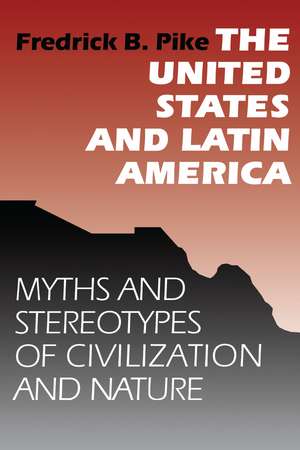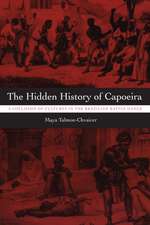The United States and Latin America: Myths and Stereotypes of Civilization and Nature
Autor Fredrick B. Pikeen Limba Engleză Paperback – sep 1992
Fredrick Pike's central thesis is that North Americans have identified themselves with "civilization" in all its manifestations, while viewing Latin Americans as hopelessly trapped in primitivism, the victims of nature rather than its masters. He shows how this civilization-nature duality arose from the first European settlers' perception that nature—and everything identified with it, including American Indians, African slaves, all women, and all children—was something to be conquered and dominated. This myth eventually came to color the North American establishment view of both immigrants to the United States and all our neighbors to the south.
Preț: 341.43 lei
Nou
Puncte Express: 512
Preț estimativ în valută:
65.34€ • 70.95$ • 54.89£
65.34€ • 70.95$ • 54.89£
Carte tipărită la comandă
Livrare economică 23 aprilie-07 mai
Preluare comenzi: 021 569.72.76
Specificații
ISBN-13: 9780292785243
ISBN-10: 0292785240
Pagini: 464
Ilustrații: 17 b&w
Dimensiuni: 152 x 229 x 15 mm
Greutate: 0.75 kg
Ediția:New.
Editura: University of Texas Press
Colecția University of Texas Press
Locul publicării:United States
ISBN-10: 0292785240
Pagini: 464
Ilustrații: 17 b&w
Dimensiuni: 152 x 229 x 15 mm
Greutate: 0.75 kg
Ediția:New.
Editura: University of Texas Press
Colecția University of Texas Press
Locul publicării:United States
Notă biografică
Fredrick B. Pike, winner of the American Historical Association's 1963 Bolton Prize, holds a distinguished graduate award from the University of Texas Institute of Latin American Studies.
Cuprins
- Preface
- 1. Nature and Its Enigmatic Images in American Lore
- Nature in One of Its Manifestations: An Evil to Be Conquered, Reformed, and Exploited
- The Mythology of Regeneration in Nature
- The Myth of Nature as Beneficent Goddess
- Nature Within, Nature Without, and Phenomena of Projection
- Worlds Within, Worlds Without, and Myths of Reconciling Opposites
- Latin America Assumes Its Place in America’s Fusion-of-Opposites Mythology
- 2. Wild People in Wild Lands: Early American Views of Latin Americans
- Stereotyping the Other: An Overview of Nature-and-Civilization Images
- Nineteenth-Century American Stereotyping of the Latin Other
- Sex and Alcohol, and Latin American Primitivism
- Anger and Passion, Rebelliousness and Anarchy: More Symptoms of Latin American Primitiveness
- Economic Failure and Latin American Primitiveness
- Religious “Primitivism” and Latin American “Retardation”
- 3. Latin Americans and Indians: Ambiguous Perceptions of an Alleged Connection
- Latin Americans: Potential Saviors of an Unfulfilled Civilization?
- Stereotypes of the Good Indian
- The Bad Indian and the Merging of Indian and Latin American Stereotypes
- Indians, Latin Americans, and Massacres
- The Civilized and the Wild, and Myths of Death and Regeneration
- Latin Resentment of American Prejudices
- Frontier Mythology and the Poisoning of Hemispheric Relations
- 4. Our Frontier and Theirs: American Perceptions of Latin American Backwardness
- Iberian and Anglo Approaches to New World Frontiers: Underlying Differences?
- Frontier Experiences and Pejorative Comparisons: The United States and Latin America
- Gospel, Glory, and Gold, and Iberian Frontiers
- Waves of Frontier Settlement in America, and the Missing Waves in Latin America
- Cowboys and Vaqueros and Comparative Frontier Experiences
- Indians and Comparative American–Latin American Frontier Perspectives
- African Americans, Palenques, and Quilombos, and Frontier Differences
- Comparative Frontiers: Our Racial Purity, Their Mestizaje
- Positive and Ambiguous Perceptions of Mestizaje among Americans
- 5. America in the Age cf the New Imperialism
- The Alleged End of the American Frontier
- The American Quest for New Frontiers
- Soft and/or Hard Inducements to U.S. Penetration of the Latin American Frontier
- The Uplift of Colonials
- The Indian Background to Turn-of-the-Twentieth-Century U.S. Latin American Policy
- Immigrants, Indians, and Latins: The American Quest to Control the Other
- American Racism Intensifies Contempt for the Other
- Racism, Imperialism, and American Fairs
- Americans at Fairs: The Midway, the White Way, or Both Ways?
- 6. From Arielism to Modernism: Hemispheric Visions in the Age of Roosevelt and Wilson
- Arielism, North and South of the Border
- Theodore Roosevelt, Woodrow Wilson, and Hemispheric Visions
- Racism, Once More, as an Issue in Internal and External Colonialism
- Modernism’s Revolt against Modernity
- 7. The Twenties: Normalcy, Counterculture, and Clashing Perceptions of Latin America
- American Breaks in Two
- Communism as the New Primitivism Sparks American Divisiveness
- New Questers after New Frontiers: The Reemergence of a Counterculture
- Counterculture and the Cult of the Natural
- Exploring the African American Frontier in the 1920s
- Exploring America’s Indian and Hispanic Frontiers in the 1920s
- Latin America’s Lure as an Alternative and Complement to American Civilization
- Variations on Arielism Challenged by Waldo Frank’s Variations on Modernism
- Waldo Frank, Franz Boas, and the Background to the Good Neighbor Policy
- 8. The Quest for Equilibrium with Nature: The Good Neighbor Policy, 1933–1945
- The Failure of Uplift
- Cultural Pluralism Abets the Rejection of Uplift
- The New Deal and the Quest to Live More Respectfully with Nature
- Goodwill toward Latin America: Counterculture Values Enter the Establishment
- Goodwill toward Latin America: American Music, Classical and Popular
- Spanish Republicans Eclipse the Attraction of Latin American Revolutionaries
- The Late Good Neighbor Policy: Normalcy Triumphs over Utopianism
- Might-Have-Beens in Hemispheric Relations Yield to Old, and New, Realities
- 9. America’s Postwar Generation: New Variations on Old Themes
- Civilization Cleansed, Civilization Triumphant
- Civilization Threatened
- Classical and Popular Music and the Reemergence of an Adversary Culture
- The Counterculture, the Establishment, and John F. Kennedy’s New Frontier
- Third Worldism and the Issues of Cuba, Vietnam, and Nicaragua
- The Advent of a New Generation
- 10. Change and Permanence in Myths and Stereotypes: Civilization and Nature toward Century’s End
- The Balance Shifts in Civilization’s War on Nature
- A “New History” Begins as a Century Ends
- Latin America in the Context of Changing American Perceptions of the Natural World
- Embourgeoisement: The Counterculture’s Loss of Illusions about Latin America
- Latin America: Still in a State of Nature?
- The State of Nature Spreads to America
- Drugs and the Struggle of Civilization with Nature
- The Latin Americanization of America
- Popular Music and New Life for the Cult of the Natural
- Rock Music and the Displacement of External by the Internal Primitive
- In a Dark Time, the Eye Begins to See
- Notes
- Index
Descriere
How North Americans have viewed Latin America, from the time of the Pilgrims up to the end of the twentieth century.



















